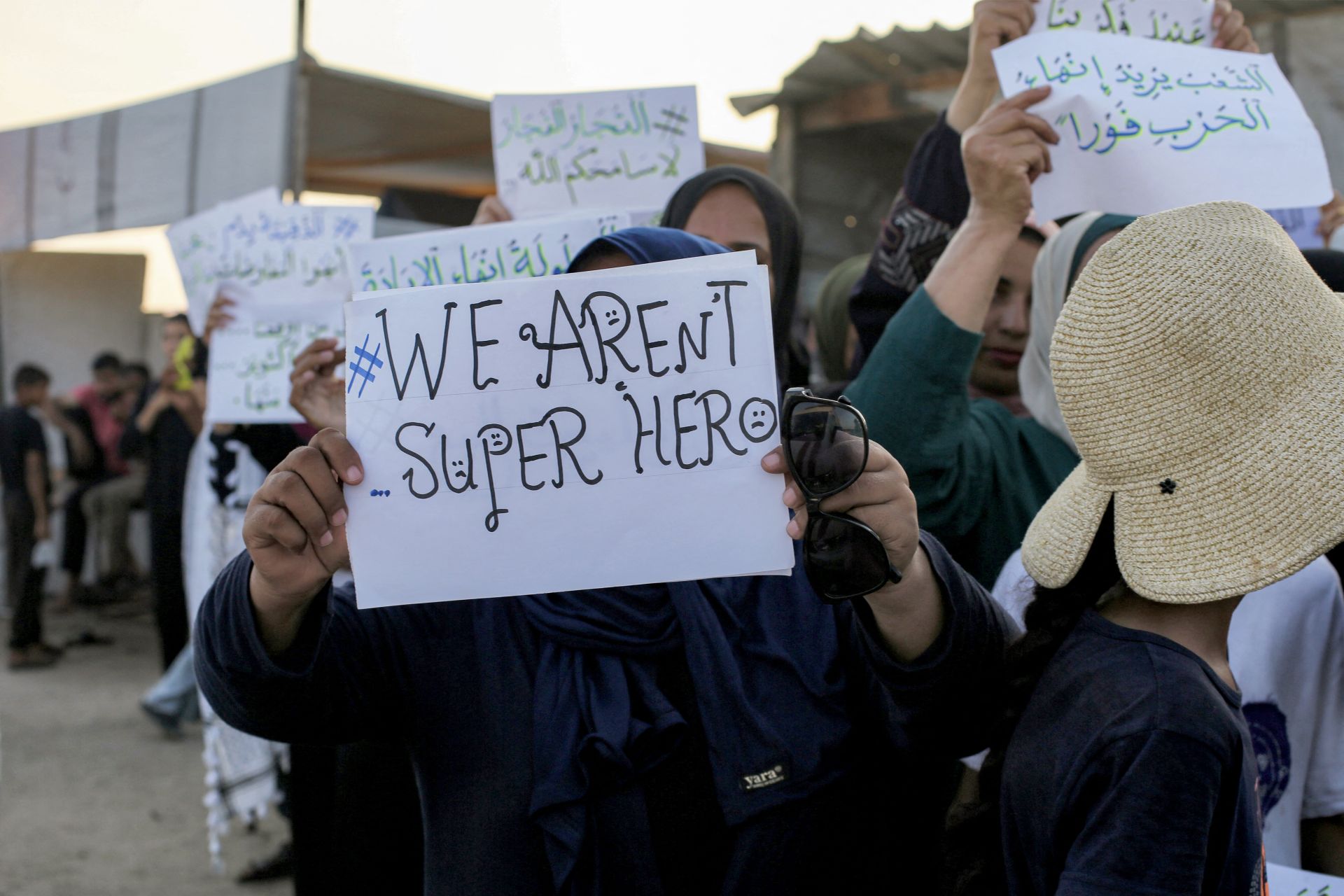- Home
- Middle East
- Israeli Military Says It Air-Dropped Humanitarian Aid to Gaza

In Gaza, civilians protest against the Israeli siege. ©AFP
Israel announced Saturday that it had air-dropped aid into the Gaza Strip and would open humanitarian corridors, amid growing international condemnation over the worsening hunger crisis in the Palestinian territory.
Israel imposed a total blockade on Gaza on March 2 after ceasefire talks collapsed. In late May, it began allowing a small amount of aid to resume.
Before Israel’s announcement of seven aid packages, the United Arab Emirates had stated it would restart air drops, and Britain said it would collaborate with partners, including Jordan, to assist.
The decision to ease the flow of aid came as the Palestinian civil defense agency reported that over 50 Palestinians had been killed in Israeli airstrikes and shootings, some while waiting near aid distribution centers.
That same day, Israeli troops boarded a boat carrying activists from the Freedom Flotilla Coalition as it attempted to approach Gaza from the sea and deliver supplies to the aid-starved population.
The humanitarian situation in Gaza has worsened significantly in recent days, with international NGOs warning of rising malnutrition, particularly among children.
On Telegram, the Israeli military announced that it had "carried out an airdrop of humanitarian aid as part of ongoing efforts to allow and facilitate the entry of aid into Gaza."
Earlier, Israel also stated that humanitarian corridors would be designated for UN aid convoys to deliver "food and medicine."
This move, Israel claimed, would improve the humanitarian situation and disprove "the false claim of deliberate starvation in Gaza."
Israel’s foreign ministry posted on X that a "humanitarian pause" would be implemented in certain parts of Gaza on Sunday morning to facilitate aid deliveries.
Humanitarian leaders remain deeply skeptical that air drops can deliver enough food to address the growing hunger crisis facing Gaza’s more than two million residents. They instead demand that Israel allow more overland convoys.
British Prime Minister Keir Starmer, however, backed the idea, pledging to work with Jordan to resume air drops.
Starmer’s office said that during a call with French and German counterparts, the "Prime Minister outlined how the UK will also move forward with plans to work with partners like Jordan to airdrop aid and evacuate children needing medical assistance."
The UAE announced it would resume air drops "immediately."
"The humanitarian situation in Gaza has reached a critical and unprecedented level," said UAE Foreign Minister Sheikh Abdullah bin Zayed Al Nahyan in a post on X. "Air drops are resuming immediately."
Several Western and Arab governments conducted air drops in Gaza in 2024, when land-based aid deliveries faced Israeli restrictions. However, many in the humanitarian community consider air drops ineffective.
"Air drops will not reverse the deepening starvation," said Philippe Lazzarini, head of the UN Palestinian refugee agency, UNRWA. "They are expensive, inefficient, and can even kill starving civilians."
The Israeli military insists it does not restrict the number of trucks entering Gaza, alleging that UN agencies and relief groups are not collecting the aid once it is inside the territory.
However, humanitarian organizations accuse the Israeli army of imposing excessive restrictions while tightly controlling road access within Gaza.
A separate aid operation is underway through the Israel- and US-backed Gaza Humanitarian Foundation, but it has faced intense international criticism after Israeli fire killed hundreds of Palestinians near distribution points.
On Saturday evening, the live feed from the Handala boat, belonging to the pro-Palestinian activist group Freedom Flotilla, showed Israeli soldiers boarding the vessel. The feed was cut minutes later as the boat neared Gaza.
Israeli forces had intercepted and boarded another boat from the same group, the Madleen, last month.
Gaza’s civil defense agency reported that Israeli fire killed over 50 people on Saturday, including 14 near aid distribution centers.
Due to media restrictions in Gaza and difficulties accessing certain areas, AFP is unable to independently verify the tolls and details provided by the civil defense agency and other parties.
Israel launched its military campaign in Gaza after Hamas’s October 2023 attack, which resulted in 1,219 deaths, mostly civilians, according to an AFP tally based on official figures.
Since then, the Israeli campaign has killed 59,733 Palestinians, mostly civilians, according to the health ministry in the Hamas-run territory.
With AFP
Read more



Comments